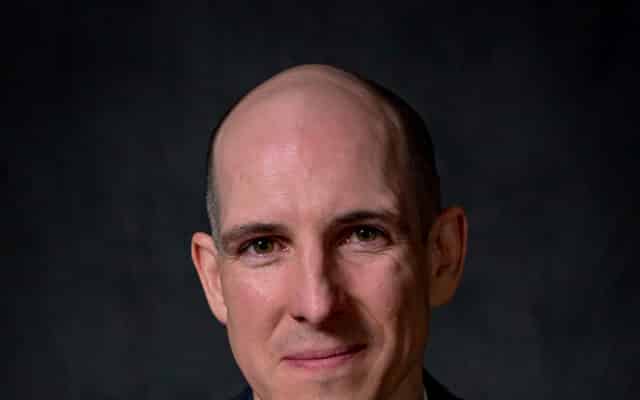
“Higher education is about possessing a zeal to know and to understand. It’s about the thrill of engaging with great thinkers, writers, and artists and their works, and about contemplating ideas that capture what it is to be human. And finally, it is the joy of sharing these things with others.”— Stephen Naumann
Faculty Information
Additional Faculty Information for Stephen Naumann
Education
Ph.D., German Studies, Michigan State University, 2012
M.A., German Studies, Michigan State University, 2006
B.A., German and Tourism & Travel, Western Michigan University, 2005
B.A., Pre-Seminary Studies, Martin Luther College, 2001
Awards
Emily Daugherty Award for Teaching Excellence, Hillsdale College, 2019
Kosciuszko Foundation Graduate Studies for Research in Poland Scholarship, 2010-11
Fulbright-Hays Doctoral Dissertation Research Abroad grant, 2009-10
Memberships
German Studies Association
American Association for Teachers of German
Memory Studies Association
Publications
“Narratives Transcending Borders: Sabrina Janesch’s Katzenberge as a German Response to Polish Migration Literature.” In Bibliotekarz Podlaski. Vol. 47, no. 2, July 2020, pp. 157-171.
“Od pamięci spornej do wspólnej na przykładzie Dzielnicy Zamkowej w Poznaniu” (“From Contested to Collective Memory on the Example of the Castle District in Poznań”). In Odkryj Dzielnicę Zamkową (Discover the Castle District). Poznań: Centrum Turystyki Kulturowej TRAKT, 2011. 119-124. Translation to Polish: A. Grzelczak.
“Solving the Stadtschloss Dilemma: What an Old Façade Will Say about New Berlin.” Saarbrücken: Verlag Dr. Müller, 2007.
Courses Taught
GRM 420: “German Literature and Culture from the Middle Ages to the 18th Century”
GRM 400: “Advanced Spoken and Written German II” (with focus on Berlin since 1945)
GRM 399: “Advanced Spoken and Written German I” (with focus on Berlin from 1850-1945)
GRM 393: “Wrestling with the Past: Vergangenheitsbewältigung in the Contemporary German Novel”
GRM 393: “German Lyric Poetry”
GRM 393: “Translation Technique and Praxis”
GRM 350: “Summer Study in Würzburg, Germany”
GRM 202: “Advanced Intermediate German”
GRM 201: “Intermediate German”
GRM 102: “Beginning German II”
GRM 101: “Beginning German I”
Core 450: “German Capstone” (co-taught with Dr. Fred Yaniga)
Collegiate Scholars Seminars
“Rebellion and Reaction: A Comparison of Social Critique in Goethe, Salinger, and Plenzdorf”
“Literary Representations of Postwar Central European Migration”
“Introduction to Polish History and Culture through Text and Film”
“Introduction to the Polish Language and Culture”
“The Liberal Arts Tradition”
“Maps, Migration, and Memory: Effects of Shifting Borders in Postwar Central Europe”
Biography
I remember sitting on the airplane flying home from my first trip to Germany with my high school’s summer program. The experience had been unbelievable, and I promised myself it wouldn’t be my last visit abroad. I’ve been back to Europe nearly twenty times since and have been blessed with the chance to live and study there on several occasions. The field is fascinating—German literature, language, history, regional culture—but it’s also amazing how much you can learn about yourself, particularly through travel. All those times abroad, and there are new things to learn each time.
One of my goals as a professor is to help students discover what interests them and what new perspectives German can give them—whether it’s the language itself, some aspect of the culture, or having access to great works of literature, film, art, and music, or to the ideas of great thinkers in philosophy, physics, or economics.
A college professor of mine would give me German books to read, and it was like an entire world opened up for me. There were so many authors writing wonderful things, and now I felt I had so much I wished to read and to learn and to think about. That feeling of excitement energized me for graduate study, and it has never left me since. Now I am able to help share that excitement with others.
That is what higher education is about; it’s about possessing a zeal to know and to understand. It’s about the thrill of engaging with great thinkers, writers, and artists and their works, and about contemplating ideas that capture what it is to be human. And finally, it is the joy of sharing these things with others.
The German program at Hillsdale is challenging but extremely rewarding. Our long-standing in-house study abroad programs in Würzburg and Saarbrücken are well-organized, successful, and very popular. Each of the faculty members brings a unique energy to the classroom and the program. Our majors take comprehensive exams as seniors and are quite proud of how much they have read and how far they have come with the language, the literature, and the culture.
The students in our German program also take their enthusiasm outside of the classroom. They turn out for films and other cultural events; our Stammtisch table in the cafeteria is full every Friday; and around campus they speak to each other and to their professors in German, which has helped to create an incredible presence here.
It is truly a privilege to work with the students here. They’re bright, they’re eager to learn, and they are up for the challenge. And while the learning that goes on here is reward enough, our graduates have gone on to achieve great things, from continued study and work abroad, to graduate programs in various disciplines, to work as educators, to a number of other various careers.
Outside of teaching, I enjoy travel and make it a priority to get to Europe each year. I also enjoy writing, reading, and sports—particularly soccer. On weeknights you’ll often find me screening films on campus, either German films for Delta Phi Alpha with Dr. Yaniga, or the Slavic Film Series with Dr. Brandon. I’m always impressed with our students’ work and talent when I am able to attend a concert or theatre performance on campus.